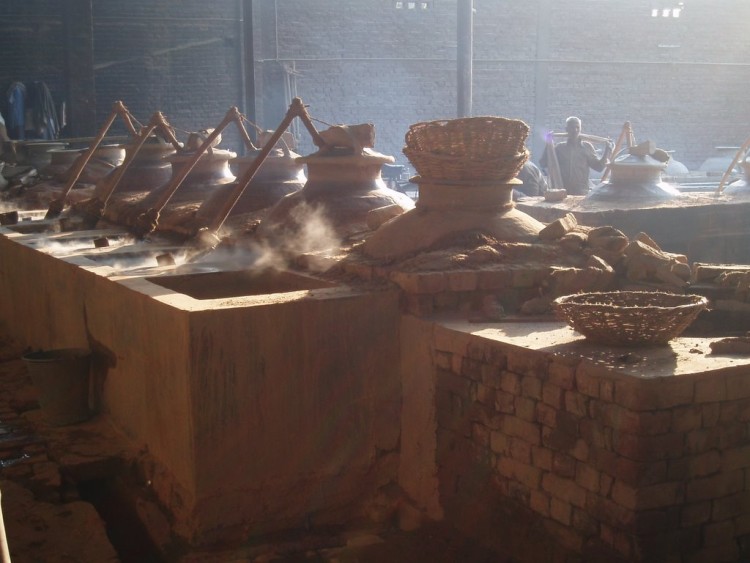
True ‘Attar’ is naturally fragrant or perfumed oil made from its parent flower petals that are distilled in water using low heat and pressure. Some such 100% pure and natural Attars are also made from exotic woods, spices and resins. They are produced through the procedure that runs over several weeks. The steam containing the fragrance oils is collected into a container of mild oil of one such exotic wood. There, both the oils blend together and are kept together until the fragrance of the exotic wood oil is completely saturated with the fragrance of the flowers.
Indian attars are the result of a multi-distillation process, whereby several fragrant materials are co-distilled in the same deg or created by mixing several distillates and attars together after distillation. In a multi-distillation process, the various fragrant materials are placed in the deg to be distilled together, with the distillers adjusting and adding to the formula over the course of the ten, or even twenty-day distillation process, beginning each day with a new blend of botanicals, resins, herbs, and spices.
Alternatively, some attars are built by mixing already-distilled attars, ruhs, choyas, or sandalwood oils together. Ambery attars, for example, although not a huge feature of Indian attar perfumery, are not derived through a single distillation of an amber material, but instead composed of several complete essential oils from materials such as labdanum and benzoin. Below is a description of some of the most characteristic and significant of traditional Indian attars.
Majmua attar is a complex blend of four other already-distilled attars and ruhs, namely, ruh khus, ruh kewra, mitti attar, and kadam attar (described individually here). Majmua displays deep, green forest-like tones first, then the pungency of hay or saffron, followed by soft fruits, brown earth, the scent of rain on terracotta pots, herbs, flowers, hay, and moss. Majmua is also suggestive of the furriness of warm animals, without containing even a drop of musk. Evolving over the course of a day, its transition from one set of aromas to the next is nothing short of mesmerizing. If one aroma could be said to predominate, it would be the bitter, mossy greenness of herbs.
Together, the combined aromas in the attar mimic the lush, earthy feel of India during monsoon season. Majmua is powerful to the point of being overbearing, especially to a Western nose. Therefore, it is not a bad idea to dilute it in carrier oil before using as a personal perfume. A Turkish perfumer friend of mine (Omer Pekji) layers it under Serge Lutens’ beastly Muscs Khoublai Khan, and I can confirm that this combination of bitter, green, and foresty with musky, sugary, and rosy works to perfection.
Shamama, sometimes also called hina (not to be confused with gul hina, which is a henna-only attar), is a highly complex attar distilled from a compound of more than sixty different aromatic materials such as woods, moss, cloves, ambrette seed, saffron, and sandalwood. Shamama attar also seems to be semi-analogous with so-called shamamatul amber, which possibly involves an evolution of the original formula to include heavier woods, labdanum, and musks. Shamamatul amber can be as pungent and as animalic as some Hindi ouds.
The exact recipe to shamama is a closely-held secret. Each traditional attar-making family has its own recipe, which is handed down from father to son unaltered. The big attar companies also produce their own version of shamama. The diversity among shamama attars means that no one shamama smells like the other.
There are any grades of shamama attar, ranging from $50 per kilo to $2,000 per kilo, depending on the amount, quality, and type of raw materials used (some shamama attars are distilled into pure sandalwood, others over a synthetic solvent like IPM). Interestingly, M.L. Ramnarain, a Kannauj-based attar distillery, which sells most of its shamama attar to Europe and the Middle East, must keep the different shamama distillations destined for different market separate. This is because most shamama attars contain charila, an oakmoss-like lichen.The third stage is a spice and herb distillation. Each day, fresh quantities of pulverized cinnamon, cardamom, mace, nutmeg, clove, patchouli leaves, and ambrette seeds are loaded into the deg, with the vapors pouring directly into the aromatized sandalwood oil in the bhapka, itself already heady with moss and aromatics.
The final stage is mixing the shamama attar with already-distilled attars, such as attar of roses, jasmine, kewra, champaca, and so on. Before finishing, other fragrant materials such as rose hydrosols, musk grains and even ambergris tinctures are added, left to macerate in a sealed pot over a very low fire for twenty-four hours, skimmed for purity, and poured into leather caskets to age and settle.
Black musk or Kasturi-type attars count as a complex attar rather than a single-material attar because, despite the name, they rarely contain natural deer musk. The hunting and killing of musk deer in India and Pakistan is illegal, and although this does not mean that attars containing real deer musk do not exist, most Kasturi-type attars use other ingredients to approximate the scent of musk. This is more due to issues of cost and availability than legality.
Kasturi-type attars derive their musky aroma through a complex array of aromatics and botanicals such as patchouli, costus root, and vetiver, mixed with either a botanical or synthetic musk. In the past, ambrette seed oil would have been the main material used to mimic the muskiness of genuine deer musk, but today, due to reasons of cost, attar makers likely use other less expensive musk botanicals or a combination of synthetic musk molecules. Musk plays a far more significant part in Arabian perfumery than in traditional Indian attar perfumery.

|

|
Currently, there are no comment.
Login to comment